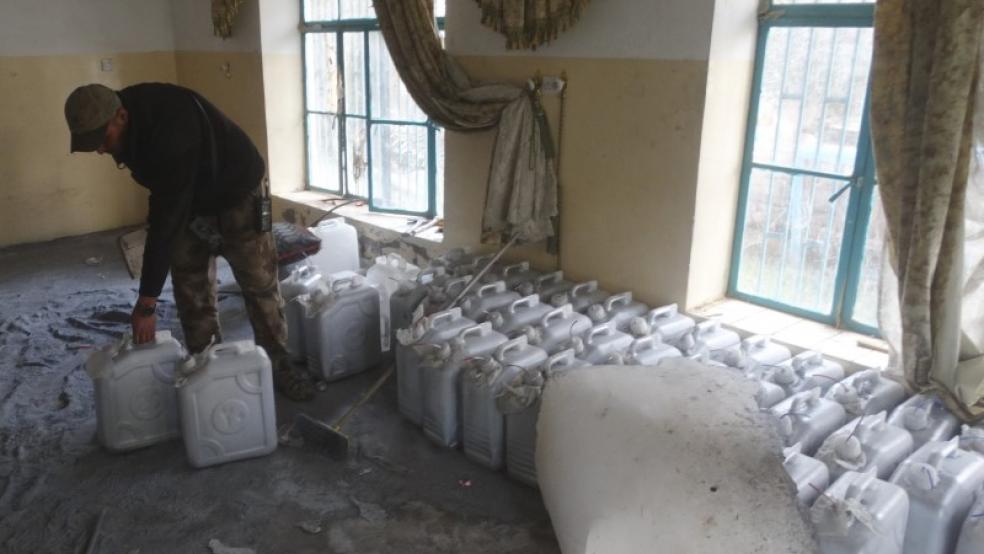BAGHDAD (Reuters) - Strain on Iraq's budget from falling oil prices is delaying the removal of Islamic State explosives in Ramadi and the restoration of basic services needed for displaced civilians to return to the western city.
The army declared victory in December over Islamic State (IS) after elite counter-terrorism forces seized the Anbar provincial capital's main government building. On Tuesday those forces reclaimed strategic territory linking the city to a major army base nearby.The recapture of Ramadi was the first major gain for the U.S.-trained army since it collapsed in the face of an assault by the ultra-hardline Sunni militants in 2014. Its recovery boosted Prime Minister Haider al-Abadi in his quest to oust IS from Mosul, northern Iraq's biggest city, later this year.But Ramadi's hundreds of thousands of residents will not be able to go home until bombs are removed and infrastructure damaged by six months of fighting is rehabilitated - operations that require tens of millions of dollars Baghdad cannot spare."We know that the government has its back against the wall fiscally. In order to stabilize areas and to help displaced families go back, we've got to do more," said Lise Grande, the United Nations' humanitarian coordinator in Iraq. She appealed to international donors for at least $40 million more for initial reconstruction efforts.Iraq, with income nearly exclusively from oil, is struggling to pay its bills amid the fall in global crude prices. Anbar Governor Sohaib al-Rawi said his provincial government had not received its share of the federal budget in about two months."The local government has accumulated debts from last year which will be paid from this budget," al-Rawi told reporters in Baghdad, declining to define the size of the debt.Besides U.N.-funded activities, he said efforts to prepare Ramadi for the return of civilians were being financed "through local efforts" of provincial authorities, without providing details.Unless additional funds are provided, it could take nine months for those efforts just to clear Tamim, a large district in southern Ramadi where the first phase of U.N. efforts will be conducted, according to Grande.The United Nations also plans to rehabilitate health, water and energy infrastructure in the city, much of which was destroyed in fighting that included Islamic State bomb attacks and devastating U.S.-led coalition air strikes."The level of destruction in Ramadi is as bad as anything we have seen anywhere in Iraq," said Grande. "Thousands of homes have to be rebuilt, thousands of buildings have to be rebuilt. The total cost of reconstruction in Ramadi is huge."STRATEGIC ADVANCETuesday's advance by Iraqi forces in Ramadi's eastern farmlands boosted government efforts to close in on Falluja, the Islamic State stronghold located halfway to Baghdad and now besieged by the Iraqi army and allied, Iranian-backed Shi'ite Muslim militias.The ultra-hardline Sunni militants of IS swept through a third of Iraq in 2014, declaring a caliphate in Iraq and Syria, carrying out mass killings and imposing a draconian form of Islam, but have since been pushed back on various fronts.A military statement broadcast on state television said the army, police and counter-terrorism forces had retaken several areas, including the town of Husaiba al-Sharqiya, about 10 km (6 miles) east of Ramadi."(Our forces) also managed to open the road from Ramadi to Baghdad that passes through al-Khaldiya," the statement added, referring to a highway that links the city to the Habbaniya army base where U.S.-led coalition forces are located."All of Ramadi has now been liberated," said al-Rawi, the Anbar governor, adding that the handover of authority to local police from the military was going smoothly. No civilians are currently living in the city, he added.It has taken more than a month for the military to clear insurgents from the eastern rural outskirts. Militants are still holed up in some northern farmlands bordering the main east-west highway, according to security sources. (Reporting by Ahmed Rasheed and Stephen Kalin; Editing by Mark Heinrich and Dan Grebler)Iraq's troubled finances slow efforts to rebuild Ramadi

STRINGER



